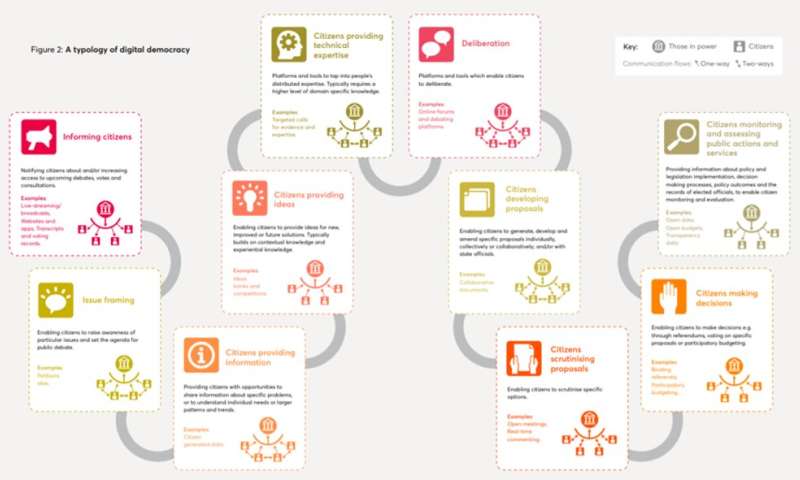April 28, 2020 by Rosalyn Old, The Conversation

This is not business as usual for democracy. As the COVID-19 pandemic rages, governments at all levels are having to work remotely, and postpone elections and parliamentary sessions. To further complicate things, they are having to do this while delivering fast-paced and effective decision-making.
But democracy must go on. Thankfully, digital tools can help keep parliaments and governments thriving in a way that enhances rather than threatens democracy. In fact, the lockdown is a key opportunity to experiment with digital methods to support democratic institutions and citizen engagement into the future.
Digital tools certainly can support remote decision-making. Our research into digital democracy shows how such tools can be used to harness the wisdom of the crowd at different stages in the democratic process.
At a personal level, whether you're a politician, a policymaker, or just an interested citizen, digital tools can efficiently collect information from different sources to provide an overview of the options and people's views on them.
To weigh up the pros and cons of a particular policy or idea, for example, platforms such as Your Priorities and Consul allow people to contribute to the debate. Meanwhile, to quickly gauge levels of support for different options, platforms such as All Our Ideas enable users to rank a live bank of ideas. And if you need to source questions from—or gauge the needs of—citizens, head to platforms such as Sli.do, or use task management tools like Trello and Asana.
For those thinking of engaging in this way, however, it is important to have a clear idea of what you want. Pick the right tools to suit your goals. Don't engage for engagement's sake. Be honest with those you're engaging with: what's involved and what are you going to do with the input? And don't think the results will be a definitive quick fix: you'll still need to devote real world time and thought to exploring the options.
Maintaining democracy during lockdown
But this is also about the big democratic institutions. While pressure to take crucial decisions quickly and remotely can put strain on the core principles of democracy, many parliaments have been exploring ways to move online while maintaining scrutiny and participation.
The UK parliament has successfully made the transition to hold its first prime minister's questions online; the EU parliament has moved to e-voting; the Scottish parliament is holding a virtual Question Time; and New Zealand's select committees are going online, too. Most of these arrangements seek to recreate physical meetings via video call, but the creative use of other tools could provide even more effective results.
The public can be directly involved in the decision-making process, too. Initiatives such as vTaiwan, France's Parlement et citoyens, and Decide Madrid, for example, enable public participation in important government discussions around law-making, budgets and other issues, potentially tailoring decisions more closely to citizen's needs and creating a greater degree of consensus. Further inspiration can be found from grassroots and civil society democratic innovators who have been testing and developing many of these approaches.
Introducing digital tools could also address several existing "pain points", such as simplifying the submission procedure for formal evidence to parliamentary committees. And democracy could be further supported by fact-checking initiatives aimed at avoiding misinformation and reducing panic.

Socially-distanced elections
Since the start of the COVID-19 pandemic, elections and referendums have been postponed, or have required physical distancing or postal voting policies to go ahead.
But plenty of systems for online voting already exist. In 2005, Estonia became the first country to host nationwide online elections; Switzerland's cantons have offered e-voting; New Zealand has an existing system to enable overseas citizens to vote which could be extended; India has electronic voting in polling stations; and online voting has been trialled for local elections in the UK and Canada.
These initiatives could now potentially provide the basis for digital voting during the current and future crises.
Indeed, by allowing civic participation at various points in the decision-making process, governments could also ease citizens' anxiety by giving them a greater sense of control over the circumstances affecting their lives. Citizens with particular skills could also be approached to contribute digitally on issues relevant to their expertise, while existing deliberation, such as the Climate Assembly UK, could be moved online.
Any plans to move this way must consider accessibility, diversity and inclusion, but such initiatives could lay the groundwork for the future of democracy.
What next?
Coronavirus has forced a rapid move towards online methods of decision-making—accelerating a process of adoption which was previously predicted to take years rather than days. But this period should be seen as a rapid prototyping phase of digital democracy on a large scale. We can now test and adapt innovative tools and methods without the usual levels of risk aversion acting as a barrier.
The tools chosen, and the way in which they are used, will have significant ramifications for the use of digital methods in the long term. Coming out of lockdown, changes to our ways of working—and thinking—will be inevitable. But what we learn from this time will inform decisions about the use of digital methods as democracies tackle some of the biggest economic, social and health challenges of our time.
Provided by The Conversation
This article is republished from The Conversation under a Creative Commons license. Read the original article.
ليست هناك تعليقات:
إرسال تعليق